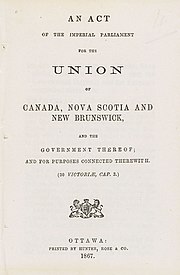| Citizens Insurance Co of Canada v Parsons | |
|---|---|
 Citizens Insurance was one of the early major cases interpreting the British North America Act, 1867 | |
| Court | Judicial Committee of the Privy Council |
| Full case name | The Citizens Insurance Company of Canada and The Queen Insurance Company v Parsons |
| Decided | 26 November 1881 |
| Citations | [1881] UKPC 49, (1881) 7 App.Cas. 96 |
| Case history | |
| Prior actions | Citizens' and The Queen Insurance Cos. v. Parsons; Western Ins. Co. v. Johnston (1880), 4 SCR 215, 1880 CanLII 6, affirming a decision of the Ontario Court of Appeal |
| Appealed from | Supreme Court of Canada |
| Court membership | |
| Judges sitting | Sir Barnes Peacock Sir Montague Smith Sir Robert P. Collier Sir Richard Couch Sir Arthur Hobhouse |
| Case opinions | |
| Decision by | Sir Montague Smith |
| Keywords | |
| Constitutional law, division of powers, trade and commerce, property and civil rights, insurance | |
Citizens Insurance Co of Canada v Parsons[1] is a major Canadian constitutional case decided by the Judicial Committee of the Privy Council, at that time the highest court of appeal for the British Empire. The case decided a significant issue of the division of powers between the federal Parliament and the provincial legislatures. The approach taken to provincial power, as advocated by Premier Oliver Mowat of Ontario, began to set the constitutional framework for broad provincial powers and a reduction in the centralist vision of Confederation espoused by Prime Minister John A. Macdonald.
At issue was the scope of provincial legislative jurisdiction over property and civil rights under s. 92(13) of the British North America Act, 1867 (now the Constitution Act, 1867) compared to the federal power over trade and commerce under s. 91(2). The Judicial Committee held that the provincial power included regulating individual business contracts, in this case insurance contracts, while the federal trade and commerce power related to matters that affected Canada as a whole, but did not extend to regulating particular businesses.
Although the point in issue was a matter of insurance law, the constitutional aspect of the decision was far-reaching. The Judicial Committee decision rejected a broad interpretation of the federal trade and commerce power, and established a substantial reading of the provincial property and civil rights power.
The case continues to be regularly cited by the Supreme Court of Canada in division of powers cases.
- ^ The Citizens Insurance Company of Canada and The Queen Insurance Company v Parsons [1881] UKPC 49, [1881] 7 A.C. 96 (26 November 1881), P.C. (on appeal from Canada)